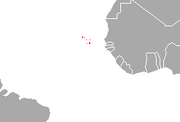|
Federal Republic of Iberia | ||||||
| ||||||
| Motto
"Plus Ultra" Further Beyond | ||||||
|
Anthem Himno de Riego | ||||||
 | ||||||
| Capital | Madrid | |||||
|
Offical Languages |
Spanish, Portuguese, Catalan, Basque | |||||
| Religions | Roman Catholcism, Islam, Indiegious religions | |||||
| Government | Federal Republic | |||||
| President | José Hesaña | |||||
| Prime Minister | Francisco Helmaro | |||||
| Legislature | Parliament | |||||
|
History -Royal abication- 1930 -Constitution- 1931 -Union of Vigo- 1934 -Reformation- 1939 |
||||||
|
Area 2964498 km2 |
||||||
|
Population 49,820,963 | ||||||
| Currency | Peseta | |||||
The Federal Republic of Iberia is a sovereign, great power nation existing in western Europe, Africa, and Oceania. It is the most populous nation with Spanish as an offical language, and second most populous with Portuguese as an offical language.
History[]
The Republic of Spain (1930-1939) was formed by winning the ruling election after Alfonso XIII left the nation. The republic showed relative prosperity, creating a constitution and merging with Portugal in 1935. In 1939, a growing insurgent movement begin following Manuel Azana's president-for-life declaration. The military quickly seized power with little violence and reformed the nation into a Federal Republic based of the United States. The young Federation fortified positions along the Pryness agaisnt Germany and Vichy France and assisted the allies during WWII, narrowly avoiding German occupation. Extreme tensions with France began when France attempted an invasion to gain Catalonia in the early 1950's, however NATO put both the Catalan invasion and Beneluxian invasions down. Andorra was quickly occupied by Iberian forces for protection, although it was given independence soon after. Tensions almost broke into war three times that year, when France funded, supplied, and ignited rebellions in Angola, Catalonia, and Iberia's ally Italy's colony, Somalia although all three failed. The Francoberian border remains heavily fortified and gaurded.
Government[]
The government of Iberia consist of a four branch system: Presidental branch, Legislative branch, Ministry branch and Supreme Court. The president has the most power in the Iberian government. He/She is elected through an alternative, multi-party system. Every citizen above the age of 18 (including people living in African colonies) are allowed to vote for the president.
Foreign Relations[]
Allies- NATO (USA, Canada, United Kingdom, Ireland, Norway, Andorra, Germany, Denmark) Italy, Morocco, Turkey, Balkan Union, Iran, Uruguay, Costa Rica-Panama, Peru, Cuba, and Venezuela, Beneluxian Independence Fronts, Argentina, Arab Maghreb Army, Morocco
Friendly- Latin Empire, Polska, Argentina, Columbia, Bolivia, Paraguay, Ecuador, Dominican Republic
Strained relations- Algeria, Madagascar, Gabon, Congo
Enemies (as listed by the government)- France
At war- none
Civil Liberities[]
Every citizen, wither they are in Dili, Lisbon, or Bata, enjoy full civil liberities garunteed by the constitution. These liberities include freedom to vote, freedom to run, freedom to religion, freedom of speech, freedom of expression, and more. Due to the pluricontinental ideology that is expressed by the government, all Iberians living in colonies enjoy as much civil and political rights as one living in mainland Iberia. This contributes to the approval of Iberian ownership in Africa.
Resources[]
The following natural resources are found within Iberia and her overseas territories:
oil, coal, diamonds, lignite, natural gas, citrus, iron, copper, lead, zinc, uranium, tungsten, mercury, bananas, pyrites, magnesite, fluorspar, gypsum, coffee beans, sepiolite, kaolin, potash, hydropower, cocoa, arable land, cork, salt, fish, tomatoes, gold, silver, phosphates, bauxite, limestone, granite, timber, pozzolana, tantalum, feldspar, titanium, graphite, manganese, marble
Military[]
Iberia contains a trained, prepared army of 671,000 and a reserve of 790,000. It is divided in 3 main branches, each with their own primary commanders, and several smaller branches
National Ground Forces (Fuerzas Nacionales de Tierra)[]
The National Ground Forces (NGF, Fuerzas Nacionales de Tierra, or FNT) is the primary branch of Iberia's military and is reponsible for all ground operations conducted by Iberia. It's commander is Marcos Hagaro.
Iberian National Army[]
The Iberian National Army (INA) is the primary branch of National Ground Forces and arguably the most important branch in the military. It's commander is Francisco de Valencia-Leon.
Elite Assualt Forces of Iberia and Africa[]
The Elite Assualt Forces of Iberia and Africa (EAFIA) is Iberia's elite military branch, conducting classified assualts. It is armed with the best equipment in Iberia. It's commander is José Santos Almedia.
Presidental Protection Service[]
Presidental Protection Service (PPS) is the most well trained unit in the military, and also the smallest. It's primary duty is to gaurd the president of Iberia. It's commander is the president himself.
National Civilian Unit[]
The National Civilian Unit (NCU) is responsible for evaucation or quarintine for civilians during natural diasters, wars, and epidemics. It's commander is Maria Llanes Gelaz.
[]
[]
EAFIA Marines[]
National Aerial Forces[]
Iberian Air Force[]
EAFIA Aerial Force[]
Aerial Civilian Unit []
States & Provinces[]
Iberia is divided into 15 different, autonomous states (and one Federal District), which are then divided into different provinces. (more info on each state coming soonings)
Spain[]
Capital: Zaragoza

Catalan Country[]
Capital: Barcelona

Basque Country[]
Capital Bilbao

Galicia[]
Capital: A Courña

Andalusia[]
Capital: Sevilla

Portugal[]
Capital: Lisbon

Federal District of Madrid
Capital: Madrid

Atlantic Islands[]
Capital: Las Palmas

North Morocco[]
Capital: Tangier

Western Sahara[]
Capital: El Aaiún

Cape Verde[]
Capital: Praia

Guinea Bissau[]
Capital: Bissau

Equatorial Guinea[]
Capital: Bata

Angola[]
Capital: Luanda

Mozambique[]
Capital: Maputo

East Timor[]
Capital: Dili

